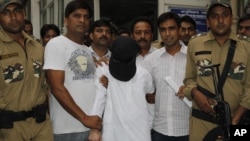NEW DELHI — Pakistan's foreign secretary is in India for talks likely to be dominated by terrorism and security issues.
His visit comes days after India repeated accusations of Pakistani involvement in the 2008 terror attacks in its financial hub Mumbai.
Pakistani foreign secretary Jalil Abbas Jilani arrived in New Delhi Tuesday promising India support in its fight against terrorism.
He called on New Delhi to share all information regarding a key suspect who Indian officials say has revealed that the 2008 Mumbai siege was coordinated in Pakistan with state support.
“We have requested the Indian government to share us with evidence and we will extend every possible cooperation," Jilani said. "Criminals are criminals in Pakistan and they are criminals in India. Anyone who indulges in terrorism, we consider him or her a terrorist.”
Pakistan has denied any involvement in India’s worst ever terror strike that killed 166 people. Ten gunmen attacked luxury hotels, a train station and a Jewish cultural center during the three-day siege in Mumbai. India blamed the Pakistan-based militant group Lashkar-e-Taiba for the attacks.
When foreign secretaries from the two countries meet on Wednesday, New Delhi will focus on its allegations that the attacks could not have been carried out without the support of Pakistani state actors.
Indian authorities arrested a key suspect in the attacks last month. Investigators say Abu Jindal, also known known as Syed Zabiuddin, has since revealed that he and Lashkar-e-Taiba founder, Hafiz Saeed, were present in a control room in the Pakistani city of Karachi during the attacks.
New Delhi says Jindal, an Indian national, was given a Pakistani passport.
Bharat Karnad, a security analyst with New Delhi’s Center for Policy Research, says revelations by Jindal have reinforced Indian concerns about alleged Pakistani support to terrorism.
“It’s evidence hard to refute," said Karnad. "The terrorism problem is going to be brought up because it is quite central to the Indian concern.”
During talks this week, Indian and Pakistani officials will also discuss trade, confidence-building measures and the disputed region of Kashmir.
India is also expected to raise the release of an Indian prisoner, Sarabjeet Singh, who has been on death row in Pakistan for 20 years.
The peace process, which was suspended following the Mumbai terror strikes, resumed last year and the Pakistani foreign secretary is hopeful of moving the dialogue forward.
“I have brought a message of goodwill, peace and prosperity from the people of Pakistan for the people of India and the leadership of India,” said Jilani.
The talks between the foreign secretaries are expected to set the stage for a meeting between the foreign ministers of the longtime South Asian rivals next month.
His visit comes days after India repeated accusations of Pakistani involvement in the 2008 terror attacks in its financial hub Mumbai.
Pakistani foreign secretary Jalil Abbas Jilani arrived in New Delhi Tuesday promising India support in its fight against terrorism.
He called on New Delhi to share all information regarding a key suspect who Indian officials say has revealed that the 2008 Mumbai siege was coordinated in Pakistan with state support.
“We have requested the Indian government to share us with evidence and we will extend every possible cooperation," Jilani said. "Criminals are criminals in Pakistan and they are criminals in India. Anyone who indulges in terrorism, we consider him or her a terrorist.”
Pakistan has denied any involvement in India’s worst ever terror strike that killed 166 people. Ten gunmen attacked luxury hotels, a train station and a Jewish cultural center during the three-day siege in Mumbai. India blamed the Pakistan-based militant group Lashkar-e-Taiba for the attacks.
When foreign secretaries from the two countries meet on Wednesday, New Delhi will focus on its allegations that the attacks could not have been carried out without the support of Pakistani state actors.
Indian authorities arrested a key suspect in the attacks last month. Investigators say Abu Jindal, also known known as Syed Zabiuddin, has since revealed that he and Lashkar-e-Taiba founder, Hafiz Saeed, were present in a control room in the Pakistani city of Karachi during the attacks.
New Delhi says Jindal, an Indian national, was given a Pakistani passport.
Bharat Karnad, a security analyst with New Delhi’s Center for Policy Research, says revelations by Jindal have reinforced Indian concerns about alleged Pakistani support to terrorism.
“It’s evidence hard to refute," said Karnad. "The terrorism problem is going to be brought up because it is quite central to the Indian concern.”
During talks this week, Indian and Pakistani officials will also discuss trade, confidence-building measures and the disputed region of Kashmir.
India is also expected to raise the release of an Indian prisoner, Sarabjeet Singh, who has been on death row in Pakistan for 20 years.
The peace process, which was suspended following the Mumbai terror strikes, resumed last year and the Pakistani foreign secretary is hopeful of moving the dialogue forward.
“I have brought a message of goodwill, peace and prosperity from the people of Pakistan for the people of India and the leadership of India,” said Jilani.
The talks between the foreign secretaries are expected to set the stage for a meeting between the foreign ministers of the longtime South Asian rivals next month.




